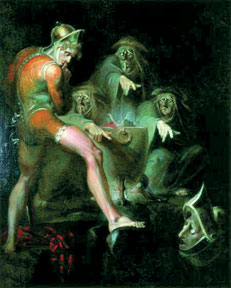Shakespearean work and common mental disorders
Dr Ruwan M Jayatunge M.D.
 |
|
William
Shakespeare |
The eminent English poet and playwright William Shakespeare created
many characters that appear to be afflicted by psychological and
psychiatric disorders. Shakespeare had an exclusive ability to grasp the
dynamics of the human mind and fathom the dysfunctions of the human
psyche. Indeed Shakespeare was very comprehensible in his descriptions
of various psychological and psychiatric symptoms. Shakespeare's
influence on psychopathology was immeasurable. Many of Shakespeare's
lead characters seem to be having mental disorders and even psychoses.
Mental conditions
William Shakespeare's work confers a wide range of human mental
conditions including psychopathology. There are many Shakespearean
characters show numerous criteria for mental disorders that is discussed
in DSM 4(Diagnostic and Statistical Manual of Mental Disorders, a manual
published by the American Psychiatric Association that covers all mental
health disorders for both children and adults) and the ICD 10 (The
International Statistical Classification of Diseases and Related Health
Problems classified by the WHO)
Shakespeare's tragedy Othello: The Moor of Venice exemplifies a
character that has suggestive features of pathological jealousy. The
play is based on a central character Othello a Moorish general in the
Venetian army who is passionately in love with Desdemona the daughter of
a Senator. Poisoned by pseudo friends Othello suspects innocent
Desdemona and gradually it becomes an overvalued fatal idea. Othello is
overwhelmed by morbid jealousy confronts Desdemona, and then kills her.
Jealousy is a complex emotion allied with insecurity, fear and
anxiety. Othello was a romantic as well as an egoistic lover who held a
delusional belief that his wife was being unfaithful. Othello made
repeated accusations of infidelity based on insignificant evidence.
Othello's delusional jealousy had strong association with violence that
led to the death of his wife. Shakespeare presents Othello's character
in a dramatic way and intensely describes his inner mental conflicts.
Shakespeare's story of King Lear illustrates an aging monarch who is
blind to his weaknesses, decides to divide his kingdom amongst his three
daughters. The King Lear often stalks his daughter Cordelia who is the
loyal and unselfish. Finally Lear was made to abdicate the throne by his
two daughters Goneril and Regan. After the renunciation of the thrown
the King Lear was mistreated by two of his daughters and finally driven
out in to destitution. His misjudgement of his daughters brings about
his downfall. Thus the King Lear was betrayed by his own flesh and blood
and becomes a psychologically fragile man.
The story of King Lear is a clear narration of old age depression.
Physical illness
Depression is the commonest and the most reversible mental health
problem in elderly. Depression is associated with physical illness and
disability, life events, social isolation and loneliness. Some experts
consider depression as a form of physiological reaction to the old age.
King Lear becomes isolated and his negative thoughts consist of
worthlessness, hopelessness, guilt, agitation and indecisiveness.
Many Shakespearian characters fit to the criteria for Histrionic
Personality Disorder. In King Lear Edgar the Gloucester's loyal son and
heir fits to this description. Histrionic Personality Disorder is a
condition characterized by excessive emotionality and attention-seeking.
They need to be the centre of attention all the time, Individuals with
this disorder may have difficulty achieving emotional intimacy in
romantic relationships.
They may seek to control their partner through emotional manipulation
or seductiveness on one level, whereas displaying a marked dependency on
them at another level. Histrionics also tend to exaggerate friendships
and relationships, believing that everyone loves them.
Shakespeare's psychological drama The Winter's Tale was a story
between two friendly kings Leontes, King of Sicilia and Polixenes, the
King of Bohemia.
Unexpectedly kings Leontes goes insane and suspects that his pregnant
wife Queen Hermione has been having an affair with the king Polixenes.
Shakespeare dramatically portrays the king Leontes's delusional mind
which filled with suspicion and conspiracy theory. Shakespeare's romance
The Winter's Tale recounts a man with a delusional disorder.
The Tempest
Delusional disorder is a type of mental illness in which the patient
has unshakable beliefs in something untrue. These delusions usually
involve the misinterpretation of perceptions or experiences. King
Leontes had persecutory delusions and he was preoccupied with his
delusions that made his life disrupted.
In Shakespeare's romance, The Tempest is set on a fictional Island.
Prospero the Duke of Milan and his daughter, Miranda have been
stranded for twelve years on this fictional Island. Although Prospero
was the rightful duke of Milan he was forced to renounce his kingdom by
his younger brother Antonio. Prospero is living in exile. Prospero is a
scholar and magician manipulating everyone within his reach. Prospero
sometimes seems as an autocratic. Prospero is a complex personality
shifting between good and bad. Ambiguity in Prospero's character
testifies Shakespeare's gifted ability to create different
personalities. Some view this enigmatic protagonist as a surrogate for
Shakespeare.
Psychoanalyst Dr Sigmund Freud saw Shakespeare via a psychoanalytic
lens and did psychoanalytic readings of Shakespearian work especially
Macbeth and Hamlet. Shakespeare's tragedy Macbeth is another example of
a play that contains a character with personality disorder. Macbeth is
more like a dependent personality avoiding responsibility for major life
decisions, allowing others to assume that power. He goes to great
lengths to win the approval of others. Lady Macbeth suffers from an
irritable self punishing behaviour which reminds obsessive-compulsive
disorder. She has obsessive thoughts and engages in compulsively actions
such as repeated hand washing.
Lady Macbeth's sleepwalking is co morbidly connected with
dissociative features.
In the Shakespearian tragedy Hamlet, Prince of Denmark, Ophelia goes
insane and drowns herself when Hamlet rejected her love. This resembles
a typical form of acute stress disorder. According to the DSM, "The
essential feature of Acute Stress Disorder is the development of
characteristic anxiety, dissociative, and other symptoms that occurs
within 1 month after exposure to an extreme traumatic stressor. Ophelia
responded to Hamlet's rejection event with strong feelings of fear and
helplessness. It was an emotionally painful, distressful event for her.
Ophelia's reduced sense of surroundings, depersonalization and increased
state of anxiety well pronounced in the act.
Complex characters
Shakespeare made Hamlet's character in an enigmatic way and Hamlet
has become one of the complex characters of Shakespeare. Hamlet was
emotionally plagued when he revealed his mother's adulterous
relationship with Claudius, Hamlet's uncle. He was devastated over the
father's assassination. Hatred towards Claudius, Hamlet's uncle and new
stepfather who murdered his father made him to seek retaliation. Freud's
psychoanalytic profile of Hamlet's character suggests that Hamlet had an
unnatural love for his mother Gertrude the Queen of Denmark. This very
idea coincides with the fact that his inability to love Ophelia.
In Twelfth Night one of the main characters, Olivia is totally
withdraws from society to mourn the death of her brother. She rejects
romance and deviates from worldly pleasures. Her self punishing and
self-denial behaviour is strongly connected with her mood. Shakespeare's
elaboration on Olivia's mental state is closer to a person diagnosed
with Adjustment Disorder. After the major stressful life event she often
experiences feelings of depression and anxiety. Olivia has disturbance
of conduct and acts out inappropriately.
Alcohol consumption
 |
|
Macbeth
consulting the prophesy |
Alcohol dependence is classified under the Substance Related
Disorders in DSM4. Shakespeare's history plays Henry IV and Henry V
recounts Alcohol Dependence which is often a progressive and fatal
disease. In Henry IV and Henry V the subjects are craving for alcohol
and unable to reduce or stop alcohol consumption and physiological
dependence is well pronounced.
Richard III comes to power through a series of horrible acts, killing
off his enemies, his kinsmen, his wife and most of his supporters.
Shakespeare had dramatized the actual historical events to describe
Richard as a pure, self-professed villain of monstrous proportions.
Richard III experiences nightmares could be as a result of Sleep
Disorder. During rapid eye movement (REM) sleep vivid dreaming is most
common. In nightmares the subject wakes abruptly from the fourth stage
of sleep (deep sleep), with waking usually accompanied by gasping,
moaning, or screaming. Night terrors are often triggered by emotional
conflict. Hence Shakespeare gives a detail account of a Sleep Disorder
which was evident in Richard III.
In Pericles, Prince of Athens an altered state of consciousness that
mimic death is described in the In the Act III, Scene II when Cerimon
opens Thaisa's coffin. An altered state of consciousness, (ASC) is a
specific condition which is significantly different from a normal waking
beta wave state. An altered state of consciousness can occur under the
oxygen deprivation. Some view hypnosis as an altered state of
consciousness.
Shakespeare knew about the effects of syphilis and refers to the
illness as pox in his plays. Shakespeare especially in Measure gaudily
describes syphilitic symptoms for Measure, Love's Labour's Lost, The
Life of Timon of Athens, and some of his poems. During the Shakespearean
days diseases were considered as punishment for sinful behaviour.
Syphilis is a sexually transmitted disease caused by Treponema
pallidum. Syphilitic infection can cause complications such as
Neurosyphilis which has physical and psychological manifestations
(notably psychiatric abnormalities) with marked personality changes.
Patients with Neurosyphilis may have dementia memory loss, depression,
mania and many other features.
Cultural icon
William Shakespeare is the best known author in history and he is
regarded as a cultural icon. Shakespeare was a true genius who made a
remarkable analysis on human psyche. His observations were quite unique
and he presented his literary characters so naturally expressing their
inner mental conflicts and behaviour in an aesthetic form. Perhaps
Shakespeare qualifies to earn the title Medieval Psychoanalyst. |



